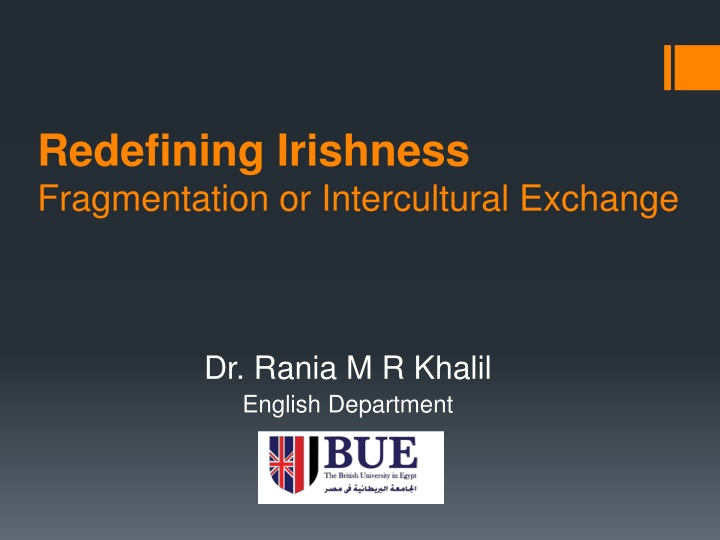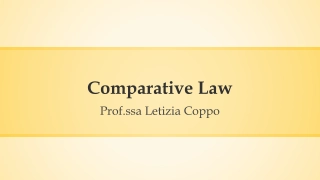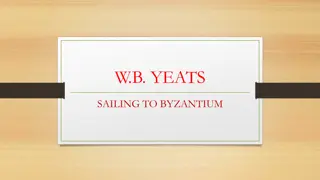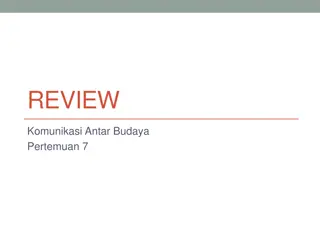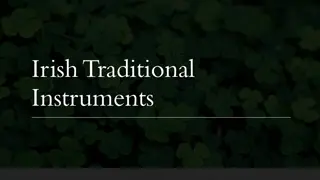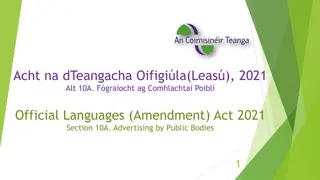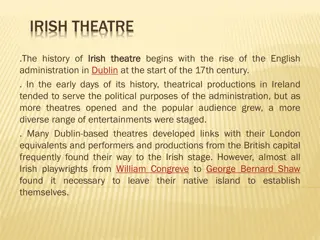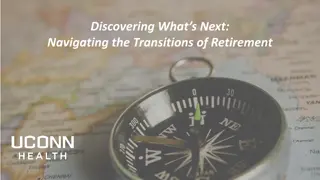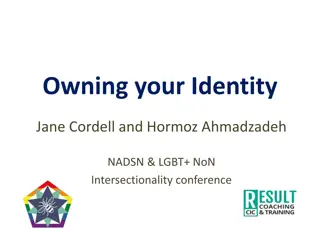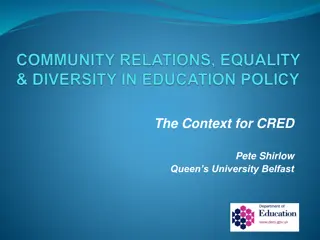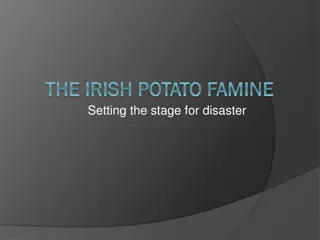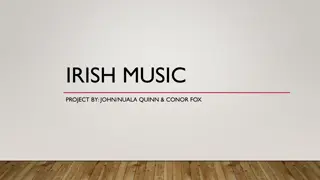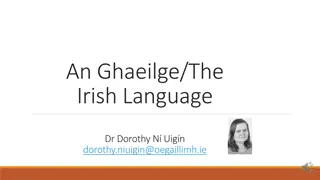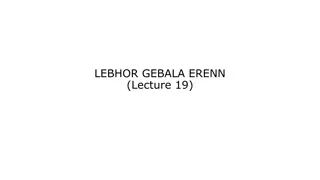Redefining Irish Identity in a Globalized World
Exploring the complexities of Irish identity in a post-colonial, globalized society through the lenses of cultural fragmentation, intercultural exchange, and the evolving narratives of contemporary Irish playwrights. The discourse delves into the challenges of maintaining a distinct Irish identity while navigating the forces of globalization and redefining traditional notions of Irishness. Highlighting the tension between national identity and the pressures of globalization, the narrative reflects on the themes of dispossession, belonging, and the need for a reimagined Irish identity in a rapidly changing world.
Download Presentation

Please find below an Image/Link to download the presentation.
The content on the website is provided AS IS for your information and personal use only. It may not be sold, licensed, or shared on other websites without obtaining consent from the author.If you encounter any issues during the download, it is possible that the publisher has removed the file from their server.
You are allowed to download the files provided on this website for personal or commercial use, subject to the condition that they are used lawfully. All files are the property of their respective owners.
The content on the website is provided AS IS for your information and personal use only. It may not be sold, licensed, or shared on other websites without obtaining consent from the author.
E N D
Presentation Transcript
Redefining Irishness Fragmentation or Intercultural Exchange Dr. Rania M R Khalil English Department
Presentation Outline: 1- Irish identity 2- Impact of globalisation & interculturalism on the Irish identity 3- Construction and deconstruction of Irish identity 4- Reinforcing Self- Identity 5- Contemporary Irish playwrights & the new Ireland 6- Dramatic representations of the new Irish identity
Our Irishness Many Irish nationalists seek a return to their roots, thereby reasserting the past that their predecessors were taught to be ashamed of. As past victims of colonialism, maintaining their individuality while remaining in the modern world poses a challenge. Declan Hughes (2000) notes: the more people agree on who you are and are not, the more your identity is fixed by others we don t know who we are any more. There is a fair possibility that we never will again. That s an exhilarating notion to take into a new century
National Identity vs Globalisation Reclamation or recuperation of identity for the Irish or any nation, can be challenging in a post-colonial society where globalisation has become an increasingly significant factor. Efforts to restore the qualities of Irish identity, result in an unavoidable fragmentation of identity in an age of multiple belongings. We are better men and women now, no doubt, but no doubt also, we have lost something which all our earnestness will not give back to us (Birmingham, 1912 quoted in Buffoonery in Irish Drama)
Internculturalism for a Post-nationalist Ireland Phillip Watt (2006) states that the remedy for unstable grounds of assimilationist approach. Governed by the desire to belong, it promotes the absorption of minorities into a shared system. This is viewed as the only way forward for a New Ireland. Irish identity is the Richard Kearney (1997) argues that Contemporary Irish identity is most at ease with itself [ ] when the obsession with an exclusive identity is abandoned.
Dispossession and Belonging Construction and Deconstruction of Irish Identity Richard Kearney suggests that traditional definitions of Irishness are overcome through internationalisation of the cultural and political discourses. Thus the obsession with an exclusive identity for the Irish must be abandoned. Through this, the premises for a newIreland is set. Fintan O Toole argues that Irishness would have to be redefined under the radical global changes which force it to re-examine its own representation both in real world measures and on the theatre stage.
Reinforcing Self Identity Assimilation, Acculturation or Transculturation Unlike assimilation and acculturation which have acquired negative connotations of subjugation, transculturation points to the forming of identities as the result of cross-cultural encounters. This, forms the basis of a nation s self portrayal and representation one that implies active intervention rather than passive victimisation (Heininge, 2009). Nations impact each other whether or not colonisation has taken place, the result is: 1-contamination not political oppression 2-shift in identity 3-adapting to the new environment
New Ireland and Contemporary Irish playwrights Contemporary playwrights initially reverted to past forms of defining Irishness to present Ireland, only to realise that the attempt to deconstruct Irish national identity in a global context is traumatic. The transformation of shifting from an individual identity to a collective one to shape the new Irishness yields fragmentation and instability.
New Images of the Stage Irish Figure To create a new stage Irish figure, Irish playwrights must first eliminate the authentic Irish stage character who is completely corrupted by misrepresentions and misreadings.
A More Progressive Irishness Many contemporary Irish playwrights base their work on articulating the formation of a new Irish identity; one associated with being fragmented socially. It is argued that the emergence of the notion of fragmentation and multiple belongings, is articulated in contemporary Irish drama in a way that is not possible through more conventional national dramatic works. The new Irish identity characterised by hybridity and newness is presented in contemporary Irish drama as a more progressive Irishness, one that is not culturally static. New places have been born, places without history, without the accumulated resonances of centuries, which prefigure the end of the fierce notion of Irishness that sustained the state for seventy years with old Irish totems of Land, Nationality and Catholicism. A liberation from the shackles of the past leaving playwrights to attempt a revision and a reinterpretation of Ireland (O Toole, 1990).
Contemporary Irish Playwrights through their dramatic texts: 1- critique in their plays uncomfortable conditions in Irish society by using mimicry 2- play out a new version of the Irish stereotype a character who resists complete assimilation in a subtle way 3- create the third space or the liminal space : a space of transition
The Irish Stage represents: 1- Authentic Irish Identity 2- Deterritorialised Irish Identity
Conclusion The paper on which this presentation is based will through the dramatic works of Brian Friel and Marina Carr attempt to analyse contemporary drama which portrays a nation striving for an identity within a global context. Unable to rise above a fragmented identity, Ireland is represented in contemporary Irish drama as emerging with a new representation of Irishness, one that is authentic and deterritorialised, yet progressive through interculturalism.
Work Cited page : Heininge, K. (2009). Buffoonery in Irish Drama: Staging Twentieth Century Post- Colonial Stereotypes. New York: Peter Lang Publishing. Hughes, D. (2000). Who the Hell Do We Think We Still Are? Reflection on Irish Theatre and Identity . In E. Jordan, Theatre Stuff: Essays on Contemporary Irish Theatre (p. 12). Dublin: Carysfort Press. Kearney, R. (1997). Postnationalist Ireland: Politics, Culture, Philosophy. London: Routledge. O'Toole, F. (1999, July 23). Irish Times . Retrieved May 12, 2015, from www.ireland.com: www.ireland.com Watt, P. (2006). An intercultural approach to "integration," . The Irish Migration, Race and Social Transformation Review, 154-63.
Contact information rania.khalil@bue.edu.eg
